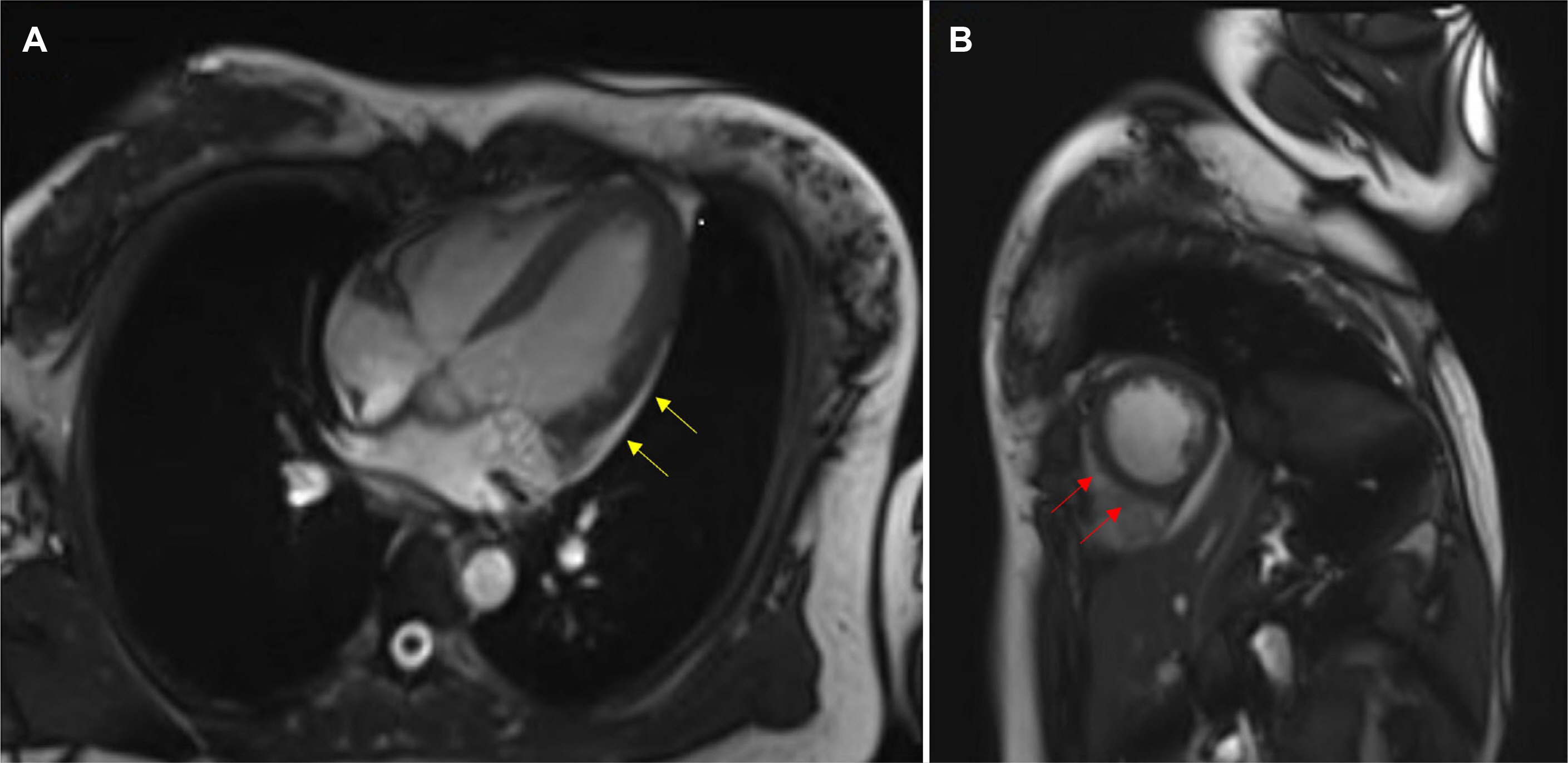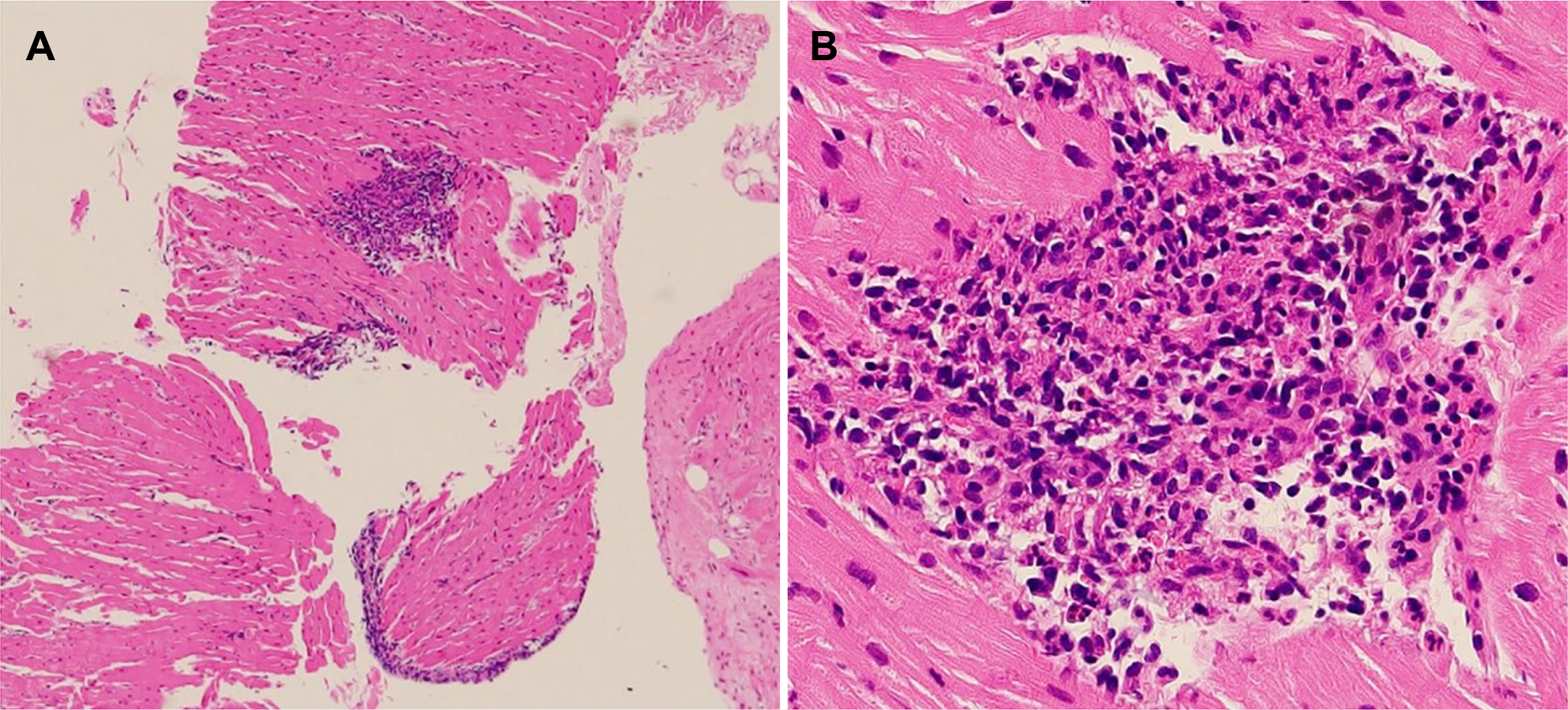Korean J Gastroenterol.
2024 May;83(5):197-199. 10.4166/kjg.2024.024.
Perimyocarditis in a Patient with Ulcerative Colitis Treated with 5-Aminosalicylic Acid
- Affiliations
-
- 1Department of Internal Medicine, Pusan National University School of Medicine and Biomedical Research Institute, Pusan National University Hospital, Busan, Korea
- KMID: 2555972
- DOI: http://doi.org/10.4166/kjg.2024.024
Abstract
- 5-Aminosalicylic acid (5-ASA) is recommended for managing ulcerative colitis. Common adverse effects associated with 5-ASA include gastrointestinal disorders, headaches, and skin rashes. Perimyocarditis induced by 5-ASA is a rare adverse effect, with only a limited number of cases reported. This paper presents a case of 5-ASA-induced perimyocarditis in a 29-year-old female who had been taking 5-ASA for three weeks. The patient was admitted to the emergency department with dyspnea, chest discomfort, and fever. She subsequently underwent laboratory investigations, including electrocardiography, transthoracic echocardiography, chest computed tomographic angiography, cardiac magnetic resonance imaging, and heart biopsy. Intravenous steroid was administered, and 5-ASA was discontinued. The patient’s signs and symptoms improved significantly within a few days of discontinuing 5-ASA, leading to her subsequent discharge. This case highlights the importance of considering perimyocarditis in patients exhibiting cardiac symptoms during 5-ASA therapy, despite it being a rare adverse effect. Drug withdrawal in such cases may lead to rapid clinical improvement.
Figure
Reference
-
1. Sehgal P, Colombel JF, Aboubakr A, Narula N. 2018; Systematic review: safety of mesalazine in ulcerative colitis. Aliment Pharmacol Ther. 47:1597–1609. DOI: 10.1111/apt.14688. PMID: 29722441.2. Brown G. 2016; 5-Aminosalicylic acid-associated myocarditis and pericarditis: A narrative review. Can J Hosp Pharm. 69:466–472. DOI: 10.4212/cjhp.v69i6.1610. PMID: 28123193. PMCID: PMC5242279.3. Kim H, Jeon H, Kong H, et al. 2006; A molecular mechanism for the anti-inflammatory effect of taurine-conjugated 5-aminosalicylic acid in inflamed colon. Mol Pharmacol. 69:1405–1412. DOI: 10.1124/mol.105.020578. PMID: 16407467.4. Kaiser GC, Milov DE, Erhart NA, Bailey DJ. 1997; Massive pericardial effusion in a child following the administration of mesalamine. J Pediatr Gastroenterol Nutr. 25:435–438. DOI: 10.1002/j.1536-4801.1997.tb01785.x. PMID: 9327378.5. Park EH, Kim BJ, Huh JK, et al. 2012; Recurrent mesalazine-induced myopericarditis in a patient with ulcerative colitis. J Cardiovasc Ultrasound. 20:154–156. DOI: 10.4250/jcu.2012.20.3.154. PMID: 23185660. PMCID: PMC3498314.6. Tschöpe C, Cooper LT, Torre-Amione G, Van Linthout S. 2019; Management of myocarditis-related cardiomyopathy in adults. Circ Res. 124:1568–1583. DOI: 10.1161/CIRCRESAHA.118.313578. PMID: 31120823.7. Triantafillidis JK, Cheracakis P, Mylonaki M, et al. 2009; Myocarditis due to mesalamine treatment in a patient with ulcerative colitis: favorable outcome after infliximab treatment. Ann Gastroenterol. 22:62–64.8. Ammirati E, Frigerio M, Adler ED, et al. 2020; Management of acute myocarditis and chronic inflammatory cardiomyopathy: An expert consensus document. Circ Heart Fail. 13:e007405. DOI: 10.1161/CIRCHEARTFAILURE.120.007405. PMID: 33176455. PMCID: PMC7673642.
- Full Text Links
- Actions
-
Cited
- CITED
-
- Close
- Share
- Similar articles
-
- 5-aminosalicylic acid in the management of ulcerative colitis
- 5-Aminosalicylic Acid-induced Myocarditis in a Patient with Atypical Ulcerative Colitis
- A Case of Acute Pancreatitis Caused by 5-aminosalicylic Acid Suppositories in a Patient with Ulcerative Colitis
- Acute Pancreatitis Induced by 5-Aminosalicylic Acid in a Patient with Ulcerative Colitis
- Advances in ulcerative colitis therapy



